2023 State Energy Conference of North Carolina Connects the Clean Energy Community
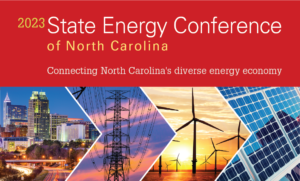 On April 25 and 26, over 800 clean energy professionals joined the NC Clean Energy Technology Center (NCCETC) for the 2023 State Energy Conference of North Carolina (SEC) at the McKimmon Center on NC State University’s campus in Raleigh, North Carolina.
On April 25 and 26, over 800 clean energy professionals joined the NC Clean Energy Technology Center (NCCETC) for the 2023 State Energy Conference of North Carolina (SEC) at the McKimmon Center on NC State University’s campus in Raleigh, North Carolina.
In its 19th year, the 2023 SEC featured more than 30 sessions to choose from across six different tracks: Residential Homes/Clean Transportation, Commercial and Industrial Buildings, Governmental and Institutional Buildings, Renewable Energy, Utilities and Infrastructure, and Innovative Technology and Deployment. Attendees from a variety of backgrounds – including state and local governments, non-profit organizations, startups, academia and corporate organizations – joined under the SEC’s theme: “Connecting North Carolina’s Diverse Energy Economy.”
The SEC serves as the premier forum highlighting and discussing energy issues in North Carolina and beyond. Attendees networked, shared success stories and best practices, and contributed to discussions about the energy industry in North Carolina. The event had over 70 experts who presented over the two-days. One of the major highlights among attendees is the networking that takes place while at the conference, but also continuing on after with the connections built during the event. The sold out exhibit hall provided a venue for companies selling products and services to showcase their offerings, and also provided a place for non-profits and academic organizations to connect and build relationships. The SEC also provides a variety of continuing education credits for most of the conference sessions and keynotes, another benefit to attendees!
Energy Policy in 2023: Different Perspectives on What’s in Play
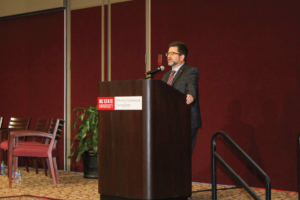 “The legislature was scheduled to have a bit of a slow year on energy, but apparently no one told them that – there are nearly 20 new bills of significance to energy policy under consideration,” said Steve Kalland, Executive Director of NCCETC, during his opening address to SEC attendees on Tuesday morning.
“The legislature was scheduled to have a bit of a slow year on energy, but apparently no one told them that – there are nearly 20 new bills of significance to energy policy under consideration,” said Steve Kalland, Executive Director of NCCETC, during his opening address to SEC attendees on Tuesday morning.
On a federal level, the Inflation Reduction Act (IRA) of 2022 represents the largest ever investment in renewable energy, energy efficiency and electric vehicles by the federal government. The bill extended and modified a number of existing tax incentives with new requirements or bonuses to favor or require onshore manufacturing, development within disadvantaged communities, and the use of fair labor practices.
On the state level, Kalland said, “The Governor has continued his strong support for clean energy with new Executive actions like Executive Order 271: Growing North Carolina’s Zero-Emission Vehicle Market.”
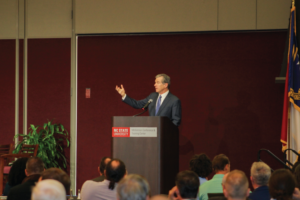 Attendees had a chance to hear about Governor Roy Cooper’s commitment to North Carolina’s clean energy future from the Governor himself on Wednesday morning. Gov. Cooper highlighted both the work North Carolina has already done to become a national leader in clean energy and the work still to be done to continue securing the state’s part in burgeoning industries like the electric vehicle (EV) market and offshore wind.
Attendees had a chance to hear about Governor Roy Cooper’s commitment to North Carolina’s clean energy future from the Governor himself on Wednesday morning. Gov. Cooper highlighted both the work North Carolina has already done to become a national leader in clean energy and the work still to be done to continue securing the state’s part in burgeoning industries like the electric vehicle (EV) market and offshore wind.
“The EV industry – the clean energy industry – is cranking up right here in North Carolina,” Gov. Cooper said. “From EV battery manufacturing in Randolph County to semiconductor production and whole EV production in Chatham County to charging station production in Durham County, North Carolina has a claim to every single link and every single job in this growing lucrative supply chain- not just the cars.”
Governor Cooper’s Executive Order 218 (EO 218) affirmed North Carolina’s commitment to offshore wind power as the state transitions to a clean energy economy. The Order also establishes offshore wind development goals of 2.8 gigawatts (GW) off NC’s coast by 2030 and 8.0 GW by 2040. EO 218 directs actions to help North Carolina secure the jobs and economic development associated with the industry’s estimated $109 billion investment over the next 15 years to develop projects from North Carolina up the Atlantic Coast.
Offshore wind was a focus for keynote speaker Joshua Kaplowitz, Vice President, Offshore Wind, for American Clean Power. Kaplowitz said, “Although there are challenges to deploying offshore wind, these challenges could be surmounted with good bipartisan support.”
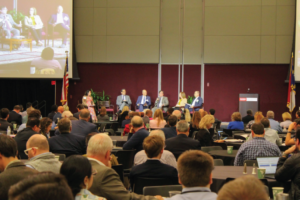 On the private sector side, Duke Energy is pursuing federal funding through the Infrastructure Investment and Jobs Act (IIJA). Kevin McLaughlin, Jr., Vice President Government Affairs and External Relations, Duke Energy Corporation discussed the utility’s application for a Southeast Hydrogen Hub during the keynote plenary session “North Carolina Energy Policy in 2023: Different Perspectives on What’s in Play.” McLaughlin added, “We were successful in securing IIJA funding for methane emissions reduction.”
On the private sector side, Duke Energy is pursuing federal funding through the Infrastructure Investment and Jobs Act (IIJA). Kevin McLaughlin, Jr., Vice President Government Affairs and External Relations, Duke Energy Corporation discussed the utility’s application for a Southeast Hydrogen Hub during the keynote plenary session “North Carolina Energy Policy in 2023: Different Perspectives on What’s in Play.” McLaughlin added, “We were successful in securing IIJA funding for methane emissions reduction.”
McLaughlin was joined by Christina Cress, Partner, Bailey & Dixon, LLP (Moderator); Representative Dean Arp, Chairman, Appropriations and Chairman, Energy & Public Utilities, NC House of Representatives; Chris Carmody, Executive Director, Carolinas Clean Energy Business Association; Peter Ledford, Clean Energy Director, Office of Governor Roy Cooper; and Betsy McCorkle, Partner at Kairos Government Affairs.
PATHWAYS TO MEET CORPORATE DEMAND FOR CLEAN POWER
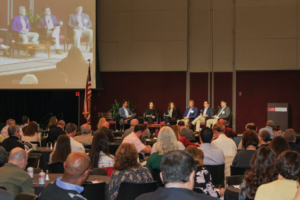 The first day of the 2023 SEC opened with a keynote plenary “Pathways to Meet Corporate Demand for Clean Power” moderated by Christopher Chung, Chief Executive Officer for the Economic Development Partnership of North Carolina. Chung was joined by Steve Frank, Strategic Sourcing Manager, Energy, Corning Incorporated; Brian George, U.S. Federal Lead, Global Market Development and Policy, Google; Samantha Soto, Product Manager Electric Vehicle DC Charging, Siemens; Brianne Miller, Director, Energy and Sustainability POlicy, U.S. Government Affairs, Microsoft; and Jerry Williams, Chief Environmental Officer, SAS.
The first day of the 2023 SEC opened with a keynote plenary “Pathways to Meet Corporate Demand for Clean Power” moderated by Christopher Chung, Chief Executive Officer for the Economic Development Partnership of North Carolina. Chung was joined by Steve Frank, Strategic Sourcing Manager, Energy, Corning Incorporated; Brian George, U.S. Federal Lead, Global Market Development and Policy, Google; Samantha Soto, Product Manager Electric Vehicle DC Charging, Siemens; Brianne Miller, Director, Energy and Sustainability POlicy, U.S. Government Affairs, Microsoft; and Jerry Williams, Chief Environmental Officer, SAS.
With private sector interest in energy transition topics at an all-time high and corporate leadership in the clean energy space, Chung asked how the corporations the panelists represent are taking steps to meet their ambitious net-zero and decarbonization targets.
For Brian George and Google, federal funding and support through incentives included in bills such as the IRA is essential for not only the adoption of clean energy, but to ensure the sustainable implementation of renewable energy sources into the existing electrical grid. “One thing the IRA does supply is there are several opportunities for states to seek funding to do competitive market research,” said George.
George also discussed the importance of identifying all value streams when considering clean energy strategies or technologies. For example, “The reliability value that transmission has provided is unquestionable,” George stated. In addition to reliability, George identified that clean energy can also provide a company with benefits around decarbonization, energy efficiency, and improving energy security.
Jerry Williams described to SEC attendees how SAS, a privately held software company founded in North Carolina, uses analytic solutions to manage the company’s global operational data, report Environmental Social and Governance performance, identify risks and opportunities, and ensure SAS is compliant with rapidly emerging environmental regulations.
Additionally, Williams noted that sustainability can be a driving factor for increasing employee recruitment and retention. Williams said the incoming workforce is showing an increasing interest in working for companies that are committed to sustainability and decarbonization.
HOW FEDERAL ACTION HAS CREATED NORTH CAROLINA FUNDING OPPORTUNITIES
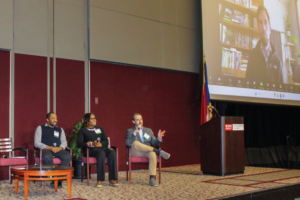 For the third year in a row, conference attendees were able to be a part of a live recording of the Squeaky Clean Energy Podcast by the NC Sustainable Energy Association’s Director of Marketing and Communications Matt Abele. On the panel for the podcast session “How Federal Action has Created NC Funding Opportunities” were Richard Ezike, Program Communications Specialist, Joint Office of Energy and Transportation; Dr. Shelley Francis, Co-Founder and Managing Partner, EVNoire; and Walter Thorn, Head of Product, ChargerHelp!
For the third year in a row, conference attendees were able to be a part of a live recording of the Squeaky Clean Energy Podcast by the NC Sustainable Energy Association’s Director of Marketing and Communications Matt Abele. On the panel for the podcast session “How Federal Action has Created NC Funding Opportunities” were Richard Ezike, Program Communications Specialist, Joint Office of Energy and Transportation; Dr. Shelley Francis, Co-Founder and Managing Partner, EVNoire; and Walter Thorn, Head of Product, ChargerHelp!
Richard Ezike spoke to North Carolina’s Clean Transportation Plan and also the funding coming out through the National Electric Vehicle Infrastructure (NEVI) Program. Established by the Bipartisan Infrastructure Law, the National Electric Vehicle Infrastructure, or NEVI, Program provides nearly $5 billion from July 2022-June 2027 to help states create a network of 500,000 electric vehicle charging stations along designated alternative fuel corridors. North Carolina expects to receive up to $109 million to build out EV infrastructure along its approved corridors.
Catch Up on Clean Energy with Conference Recordings Online
Although the 2023 SEC has now concluded, all of the conference sessions were recorded and will be offered to those who registered for two weeks after the conference. Save the date for the 2024 State Energy Conference, April 23–24, 2024! Learn more about the State Energy Conference at www.ncenergyconference.com/. A call for topics will take place in the Fall of 2023.